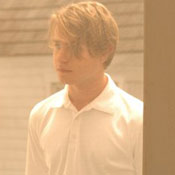- REVIEW
- READER REVIEWS
Funny Games
|
(No longer in theaters)
|
|
Genre
Suspense/Thriller
Producer
Naomi Watts
Distributor
Warner Independent Pictures
Release Date
Mar 14, 2008
Release Notes
Limited
Official Website
Review
A couple of years ago, I was the butt of Michael Haneke’s joke. The good folks at Kino Video sent me a package of the Austrian director’s pre-Caché features, from his first, The Seventh Continent, through his U.S. art-house breakthrough, The Piano Teacher. Among them was Funny Games, which Haneke has now remade with Naomi Watts and Tim Roth. The original is the tale of a well-to-do family�mom, dad, little son�whose vacation home is invaded by two courteous young men in white preppy duds who, for no apparent reason, go on to taunt them, torture them, and � I won’t say more, although I’d love to bury you under a mound of spilled beans. I watched to the end, removed the DVD from the player, and snapped it over my knee. Then, with a pair of scissors, I cut the halves into quarters, walked the pieces to the kitchen garbage can, and shoved them under the debris of the previous night’s dinner. It only hit me later that my melodramatic response would have delighted the director. It takes a special kind of talent to drive a critic who enjoys zombie cannibal pictures to cry, �Unclean!�
Naomi Watts produced this remake, apparently concluding that she hadn’t yet been sufficiently violated onscreen. King Kong, after all, turned out to be a softy�now she’s in the hairy paw of a giant ape artiste. (What is it with actors and their masochism?) I can’t say whether the American Funny Games is a frame-by-frame remake of the original (see above re my DVD), but the changes are certainly minimal. Here are the same elegant tableaux (the house is a study in off-white country chic, with touches of Laura Ashley), the same impassive camera, the same creepy-crawly flatness of tone. Michael Pitt and Brady Corbet now play �Paul� and �Peter,� who move from gated compound to gated compound, introducing themselves with a polite request on behalf of a neighbor for eggs, dropping them �by accident,� asking for more, breaking them again (oops), then resisting the owners’ increasingly hysterical pleas to leave. (�I don’t know what kind of game you’re playing.� �What game? Did I do something wrong?�) They are savage one moment and righteously indignant the next, as if all this unpleasantness were a consequence of their hosts’ discourtesy.
Haneke’s postmodern twist is that Paul occasionally turns to the camera and either winks at or addresses the audience�a bit of camp that, surprisingly, doesn’t take the edge off what we’re watching. The suffering of the mother, father, and child is hideously realistic, and our thoughts turn not to the picture’s artifice but to the line of cinematic killers who videotape their atrocities, among them the protagonists of Henry: Portrait of a Serial Killer and Haneke’s own Benny’s Video�in which a media-deadened 14-year-old boy (played by Arno Frisch, who grew up to be one of the home invaders in the original Funny Games) repeatedly watches a tape of a pig being slaughtered, then tries out the pig-killing gun on an adolescent girl in a scene that would appall even No Country for Old Men’s Anton Chigurh.
In contrast to the punkish, microbudget American �Cinema of Transgression� of the eighties, Haneke’s work is lovingly polished, juxtaposing (as Kubrick did) acts of brutality with classical music and opera. (In The Piano Teacher, the title character sabotages a prize pupil’s fingers by dumping shards of glass in her coat pocket.) Peter and Paul are more effete (and arch) than the Leopold-and-Loeb-like killers of Hitchcock’s Rope: They tearfully recount childhoods of neglect and abuse, and then break up over their fictions. They might be the final products of Haneke’s �glaciation trilogy� (Benny’s Video was in there), in which the director indicted the people of Austria for their callousness toward the carnage in Bosnia. (In Caché, the director went on to punish the French�via videos that seemed to bubble up from their collective unconscious�for repressing their crimes against Algerian immigrants.) The sociopaths of Funny Games are monstrous, but Haneke also seems to be mocking the American family they ravage for its privileged obliviousness.
I say �seems to be� because it’s difficult to grapple with serious themes when what comes through most vividly is the director’s sadism. In the end, the film is little more than high-toned torture porn with an edge of righteousness not unlike Peter and Paul’s. The home-invasion genre (Panic Room, etc.) is an especially nightmarish one: Audiences flock to these thrillers because of an implicit compact with the filmmaker that the invaders will be vanquished and the family unit saved. You could make the case that Haneke deserves a measure of respect for showing us how pathetically dependent we are on that compact and its cathartic endings. You could, but I won’t, because Haneke’s assault on our fantasy lives is shallow, unimaginative, and glacially unengaged�a sucker punch without the redeeming passion of punk.
And now that I’ve metaphorically cut the remake of Funny Games into little pieces, I picture Haneke laughing, having once again succeeded in shocking the bourgeoisie. That’s the thing about vapid provocateurs. No matter how wretched their work, they think the joke is always on us.Related Stories
New York Magazine Reviews
- David Edelstein's Full Review (3/24/08)
